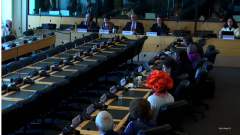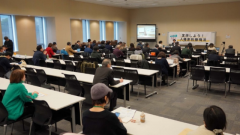UN: Summary of the CERD 102nd session
December 4, 2020
On the 24th of November, the UN Committee on the Elimination of Racial Discrimination (CERD) concluded its 102nd session. The session was held online due to restrictions under the COVID-19 pandemic. Video archives of the public meetings can be accessed at UN Web TV.
At the opening of the session, IMADR delivered a statement to call for the resumption of State reviews in 2021 either online or in a hybrid manner if in-person meetings remain not possible due to the pandemic. It also encouraged the Committee to develop a predictable calendar for State reviews to implement the recommendation from the outcome report of the 2020 treaty body review.
The Committee adopted the following documents at the 102nd session.
Follow-up letters – summary
- Cuba
- Guatemala
- Kyrgyzstan
- Montenegro
- Republic of Korea
Llists of issues prior to reporting (LOIPRs)
General Recommendation no.36 on “Preventing and Combating Racial Profiling by Law Enforcement Official”
Individual communication
The Committee adopted an opinion on Lars-Anders Ågren et al v. Sweden (CERD/C/102/D/54/2013). It found that Sweden violated the indigenous Sami people’s land rights and the right to an effective protection and remedy, in the context of the mining concessions on their traditional territory.
Early Warning and Urgent Action Procedure
 Canada: The Committee sent a follow-up letter on its decision in December 2019 concerning the absence of the free, prior and informed consent (FPIC) of the Secwepemc and We’suwet’en communities, in relation to the development of the C dam project, the approval of the Trans Mountain Pipeline Expansion project in British Columbia, and the Coastal Gaz Link Pipeline. The Committee regretted that the State party’s interpretation of the FPIC is limited to a process, but not a particular result. The Committee requested the State party to provide information in the next periodic report (due on 15 November 2021) on: a) the status of adoption of the legislation to implement the UN Declaration on the Rights of Indigenous Peoples, indicating to what extent indigenous peoples have been involved in its drafting; b) the implementation of the legislation adopted by the province of British Columbia including in relation to the abovementioned projects; and c) further efforts undertaken to engage in negotiations and consultations with the Secwepemc and We’suwet’en communities affected by the projects results.
Canada: The Committee sent a follow-up letter on its decision in December 2019 concerning the absence of the free, prior and informed consent (FPIC) of the Secwepemc and We’suwet’en communities, in relation to the development of the C dam project, the approval of the Trans Mountain Pipeline Expansion project in British Columbia, and the Coastal Gaz Link Pipeline. The Committee regretted that the State party’s interpretation of the FPIC is limited to a process, but not a particular result. The Committee requested the State party to provide information in the next periodic report (due on 15 November 2021) on: a) the status of adoption of the legislation to implement the UN Declaration on the Rights of Indigenous Peoples, indicating to what extent indigenous peoples have been involved in its drafting; b) the implementation of the legislation adopted by the province of British Columbia including in relation to the abovementioned projects; and c) further efforts undertaken to engage in negotiations and consultations with the Secwepemc and We’suwet’en communities affected by the projects results.
 Panama: The Committee issued letter concerning the situation of the indigenous Ngäbe people affected by the Changuinola 1 hydropower plant, in follow-up to its letter in December 2019. The Committee raised a concern that the 2009 Tripartite Framework Agreement was not fully implemented. The State party was requested to provide information on: specific measures adopted to declare collective land in the territories of the indigenous Ngäbe communities, in line with the Agreement; and measures to ensure the participation of the indigenous communities in the procedures related to the declaration of collective land. The Committee requested the State party to provide detailed information on the series of declaration, agreement and plan concerning the Ngäbe communities, in particular their participation in such initiatives. The State party was urged to ratify the ILO Convention No. 169 on Indigenous and Tribal Peoples. The Committee reminded the State party to submit its periodic reports without further delay, which were due in 2013.
Panama: The Committee issued letter concerning the situation of the indigenous Ngäbe people affected by the Changuinola 1 hydropower plant, in follow-up to its letter in December 2019. The Committee raised a concern that the 2009 Tripartite Framework Agreement was not fully implemented. The State party was requested to provide information on: specific measures adopted to declare collective land in the territories of the indigenous Ngäbe communities, in line with the Agreement; and measures to ensure the participation of the indigenous communities in the procedures related to the declaration of collective land. The Committee requested the State party to provide detailed information on the series of declaration, agreement and plan concerning the Ngäbe communities, in particular their participation in such initiatives. The State party was urged to ratify the ILO Convention No. 169 on Indigenous and Tribal Peoples. The Committee reminded the State party to submit its periodic reports without further delay, which were due in 2013.
 Russian Federation: The Committee issued a letter to the State party concerning allegations of judicial harassment faced by an NGO working for the promotion and the protection of the rights of indigenous peoples in the country. The Minister of Justice reportedly accused the NGO of violating the “Foreign Agent Law”, and the Moscow City Court rendered a decision on 6 November 2019 to terminate the activities of that NGO, without providing them a timeframe to correct the alleged irregularities. The First Appellate Court upheld the decision of the Moscow City Court on 3 March 2020, and the case went to the Cassation Court. The Committee requested the State party to respond to the concerns in the letter before 31 March 2021, including on: a) the outcome of the case that is pending before the Cassation Court; b) measures taken to review the Federal Agent Law and; c) whether the NGO whose activities have been terminated could correct the irregularities found, so as to resume its activities after the legal proceedings are terminated.
Russian Federation: The Committee issued a letter to the State party concerning allegations of judicial harassment faced by an NGO working for the promotion and the protection of the rights of indigenous peoples in the country. The Minister of Justice reportedly accused the NGO of violating the “Foreign Agent Law”, and the Moscow City Court rendered a decision on 6 November 2019 to terminate the activities of that NGO, without providing them a timeframe to correct the alleged irregularities. The First Appellate Court upheld the decision of the Moscow City Court on 3 March 2020, and the case went to the Cassation Court. The Committee requested the State party to respond to the concerns in the letter before 31 March 2021, including on: a) the outcome of the case that is pending before the Cassation Court; b) measures taken to review the Federal Agent Law and; c) whether the NGO whose activities have been terminated could correct the irregularities found, so as to resume its activities after the legal proceedings are terminated.
 Thailand: The Committee sent a follow-up letter on allegations of forced evictions and harassment and reported continuous and escalating violence against indigenous peoples in the Kaeng Krachan National Park (KKNP). The State party’s response to the previous letter failed to address concerns expressed in 2017 and 2019. The Committee requested for detailed information on: the implementation of the Community Forest Act adopted on 15 February 2019; measures on investigation, accountability and reparations in relation to the attacks suffered by the Karen indigenous peoples in the KKNP; measures taken to protect indigenous human rights defenders, the results of the survey on the opinion of the local communities with regard to the nomination of the KKNP as a UNESCO World Heritage site, the conclusions and recommendations following the survey on land tenure in the conserved forest areas and concrete measures taken to enter into agreements on land use as well as how local communities have been involved in the process; concrete measures and results obtained to promote the traditional way of life of the Karen communities; specific measures and guidelines to resolve the encroachment of protected forest lands and land tenure and the results of the participatory process designed to this end.
Thailand: The Committee sent a follow-up letter on allegations of forced evictions and harassment and reported continuous and escalating violence against indigenous peoples in the Kaeng Krachan National Park (KKNP). The State party’s response to the previous letter failed to address concerns expressed in 2017 and 2019. The Committee requested for detailed information on: the implementation of the Community Forest Act adopted on 15 February 2019; measures on investigation, accountability and reparations in relation to the attacks suffered by the Karen indigenous peoples in the KKNP; measures taken to protect indigenous human rights defenders, the results of the survey on the opinion of the local communities with regard to the nomination of the KKNP as a UNESCO World Heritage site, the conclusions and recommendations following the survey on land tenure in the conserved forest areas and concrete measures taken to enter into agreements on land use as well as how local communities have been involved in the process; concrete measures and results obtained to promote the traditional way of life of the Karen communities; specific measures and guidelines to resolve the encroachment of protected forest lands and land tenure and the results of the participatory process designed to this end.
 USA: The Committee sent a follow-up letter to the State party about the situation of Gwich’in indigenous peoples in Alaska. The Committee received the additional information about the release of the Coastal Plain Oil and Gas Leasing Program Record of Decision on 17 August 2020, which would constitute the final administrative step required for the Government to move forward with a lease sale of the Coastal Plain to oil and gas companies. It will allegedly cause irreparable harm to the environment and the rights of Gwich’in peoples, including the increased risk of violence against indigenous women. The State party is accused of removing existing regulations in the context of recovering from the impact of the COVID-19 pandemic. The Committee requested for information by 31 March 2021 on: (a) the status of the proposal to develop oil and gas in the Coastal Plain; (b) the mechanisms to reassess the options proposed in the Final Environmental Impact Statement regarding the oil and gas projects in the Coastal Plain; (c) concrete measures taken to protect the Coastal Plain, its wildlife and the indigenous peoples, including measures to implement the commitments under the Agreement Between the Government of Canada and the Government of the United States of America on the Conservation of the Porcupine Caribou Herd; (d) measures adopted to incorporate the UN Declaration on the Rights of Indigenous Peoples into domestic law; (e) measures adopted to ensure that isolated indigenous communities are protected from the effects of COVID-19, in consultation with them. The Committee also urged the State party to submit its periodic report which was due in 2017.
USA: The Committee sent a follow-up letter to the State party about the situation of Gwich’in indigenous peoples in Alaska. The Committee received the additional information about the release of the Coastal Plain Oil and Gas Leasing Program Record of Decision on 17 August 2020, which would constitute the final administrative step required for the Government to move forward with a lease sale of the Coastal Plain to oil and gas companies. It will allegedly cause irreparable harm to the environment and the rights of Gwich’in peoples, including the increased risk of violence against indigenous women. The State party is accused of removing existing regulations in the context of recovering from the impact of the COVID-19 pandemic. The Committee requested for information by 31 March 2021 on: (a) the status of the proposal to develop oil and gas in the Coastal Plain; (b) the mechanisms to reassess the options proposed in the Final Environmental Impact Statement regarding the oil and gas projects in the Coastal Plain; (c) concrete measures taken to protect the Coastal Plain, its wildlife and the indigenous peoples, including measures to implement the commitments under the Agreement Between the Government of Canada and the Government of the United States of America on the Conservation of the Porcupine Caribou Herd; (d) measures adopted to incorporate the UN Declaration on the Rights of Indigenous Peoples into domestic law; (e) measures adopted to ensure that isolated indigenous communities are protected from the effects of COVID-19, in consultation with them. The Committee also urged the State party to submit its periodic report which was due in 2017.





